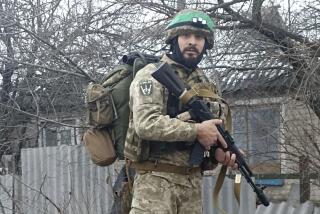Abuse of Conscripts Helps to Give Draft a Bad Name in Latin America : Military: Suicides and beatings have prompted efforts to document incidents and apprise soldiers of their rights.
- Share via
SANTIAGO, Chile — Draftee Cristian Uribe was a day overdue at his regiment after a September furlough. Other soldiers found him and brought him in. His superiors tied his arms and sent him through a gantlet of recruits under orders to beat him. Uribe was hospitalized with serious injuries.
In an Argentine artillery battalion, conscript Omar Carrasco asked for a chair at a meal one day in March. A sergeant, considering the request out of line, beat up Carrasco. A lieutenant beat him again the next day for not doing guard duty. Carrasco died of his injuries. His body was hidden for a month before his parents learned what had happened to him.
Leonardo Castro, shy and overweight, cried when drafted into the Colombian army at age 17. A lieutenant taunted him and beat him. After being forced in March to do extra exercises when he forgot to polish his boots and put on his name tag, Castro committed suicide.
These and many other incidents of abuse of conscripts have made headlines in Latin America, helping to give the draft a bad name. While such abuse persists worldwide, it has grown controversial in this region because of declining military influence, a more aggressive press and a heightened awareness of human rights.
Uribe’s beating in the northern Chilean city of Iquique stirred a storm in Santiago, the capital. A lieutenant and a sergeant have been charged in military court in the case, the latest of many that have triggered protests by Chilean human rights groups.
“Conscripts are continually pressured and humiliated,” said a statement by the church-oriented group Service, Peace and Justice in Chile. “Their own companions are ordered to beat them.”
The Latin American Faculty of Social Sciences, one of Chile’s most influential research institutes, has proposed that a commission be created to investigate complaints of mistreatment of Chilean conscripts.
Jose Sabat, president of the Youth Rights Commission in Chile, said his group hopes to distribute leaflets outside barracks advising conscripts of their rights and asking them to report abuses. He said the commission has discussed the idea with Defense Ministry officials and “I think they are going to accept it.”
Although the commission is not well-known among draftees, it has received 77 complaints about conscript abuse in the past two years. Sabat said beatings, psychological harassment and other mistreatment are common in the army but rarely reported by conscripts fearing reprisals. So far this year, he said, three Chilean draftees are known to have committed suicide.
In Colombia, 71 suicides occurred in the armed forces last year, according to an internal military investigation cited by the press. Psychologists said reasons for the suicides ranged from loneliness to verbal threats and punishments by superiors.
Draftee Castro, who killed himself in March, had hoped to study mechanical engineering at a Bogota university instead of going into the army. He was the top student in his Cali high school. With only three months to go before his release from a year’s tour in the Presidential Guard, he shot himself in the head in his barracks.
Colombian judicial authorities are investigating scores of cases of suicide, homicide, injury and verbal abuse in the military. Some complain that officers beat soldiers in the testicles and pummel them with rifles. Soldiers speak openly of the “water bath,” a beating on the buttocks with a sandal dipped in boiling water.
The Colombian Defense Ministry created an office of human rights for the armed forces this year; soldiers can now present complaints freely and anonymously with the possibility of seeing disciplinary or criminal sanctions meted out.
In Argentina, meanwhile, a lieutenant, a sergeant and a private have been charged with the beating death of draftee Carrasco.
Times special correspondent Steven Ambrus in Bogota, Colombia, contributed to this report.
More to Read
Sign up for Essential California
The most important California stories and recommendations in your inbox every morning.
You may occasionally receive promotional content from the Los Angeles Times.










